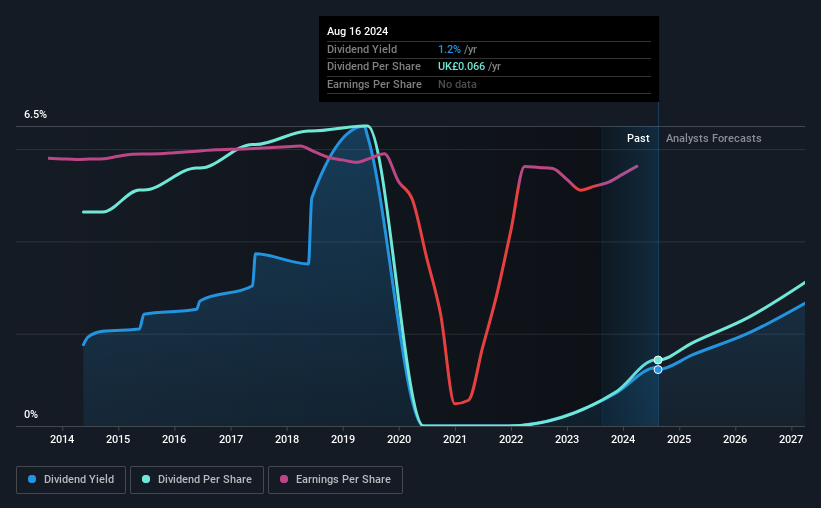- United Kingdom
- /
- Aerospace & Defense
- /
- LSE:BAB
Should Income Investors Look At Babcock International Group PLC (LON:BAB) Before Its Ex-Dividend?

It looks like Babcock International Group PLC (LON:BAB) is about to go ex-dividend in the next 4 days. The ex-dividend date is usually set to be one business day before the record date which is the cut-off date on which you must be present on the company's books as a shareholder in order to receive the dividend. The ex-dividend date is important as the process of settlement involves two full business days. So if you miss that date, you would not show up on the company's books on the record date. This means that investors who purchase Babcock International Group's shares on or after the 22nd of August will not receive the dividend, which will be paid on the 30th of September.
The company's next dividend payment will be UK£0.033 per share, on the back of last year when the company paid a total of UK£0.066 to shareholders. Based on the last year's worth of payments, Babcock International Group has a trailing yield of 1.2% on the current stock price of UK£5.40. We love seeing companies pay a dividend, but it's also important to be sure that laying the golden eggs isn't going to kill our golden goose! So we need to investigate whether Babcock International Group can afford its dividend, and if the dividend could grow.
View our latest analysis for Babcock International Group
If a company pays out more in dividends than it earned, then the dividend might become unsustainable - hardly an ideal situation. Babcock International Group has a low and conservative payout ratio of just 15% of its income after tax. That said, even highly profitable companies sometimes might not generate enough cash to pay the dividend, which is why we should always check if the dividend is covered by cash flow. Luckily it paid out just 4.9% of its free cash flow last year.
It's encouraging to see that the dividend is covered by both profit and cash flow. This generally suggests the dividend is sustainable, as long as earnings don't drop precipitously.
Click here to see the company's payout ratio, plus analyst estimates of its future dividends.

Have Earnings And Dividends Been Growing?
Companies with falling earnings are riskier for dividend shareholders. If business enters a downturn and the dividend is cut, the company could see its value fall precipitously. So we're not too excited that Babcock International Group's earnings are down 3.6% a year over the past five years.
The main way most investors will assess a company's dividend prospects is by checking the historical rate of dividend growth. Babcock International Group's dividend payments per share have declined at 11% per year on average over the past 10 years, which is uninspiring. It's never nice to see earnings and dividends falling, but at least management has cut the dividend rather than potentially risk the company's health in an attempt to maintain it.
Final Takeaway
Should investors buy Babcock International Group for the upcoming dividend? Babcock International Group has comfortably low cash and profit payout ratios, which may mean the dividend is sustainable even in the face of a sharp decline in earnings per share. Still, we consider declining earnings to be a warning sign. While it does have some good things going for it, we're a bit ambivalent and it would take more to convince us of Babcock International Group's dividend merits.
With that in mind, a critical part of thorough stock research is being aware of any risks that stock currently faces. Case in point: We've spotted 1 warning sign for Babcock International Group you should be aware of.
If you're in the market for strong dividend payers, we recommend checking our selection of top dividend stocks.
Valuation is complex, but we're here to simplify it.
Discover if Babcock International Group might be undervalued or overvalued with our detailed analysis, featuring fair value estimates, potential risks, dividends, insider trades, and its financial condition.
Access Free AnalysisHave feedback on this article? Concerned about the content? Get in touch with us directly. Alternatively, email editorial-team (at) simplywallst.com.
This article by Simply Wall St is general in nature. We provide commentary based on historical data and analyst forecasts only using an unbiased methodology and our articles are not intended to be financial advice. It does not constitute a recommendation to buy or sell any stock, and does not take account of your objectives, or your financial situation. We aim to bring you long-term focused analysis driven by fundamental data. Note that our analysis may not factor in the latest price-sensitive company announcements or qualitative material. Simply Wall St has no position in any stocks mentioned.
About LSE:BAB
Babcock International Group
Engages in the design, development, manufacture, and integration of specialist systems for aerospace, defense, and security in the United Kingdom, rest of Europe, Africa, North America, Australasia, and internationally.
Undervalued with solid track record.
Similar Companies
Market Insights
Community Narratives




